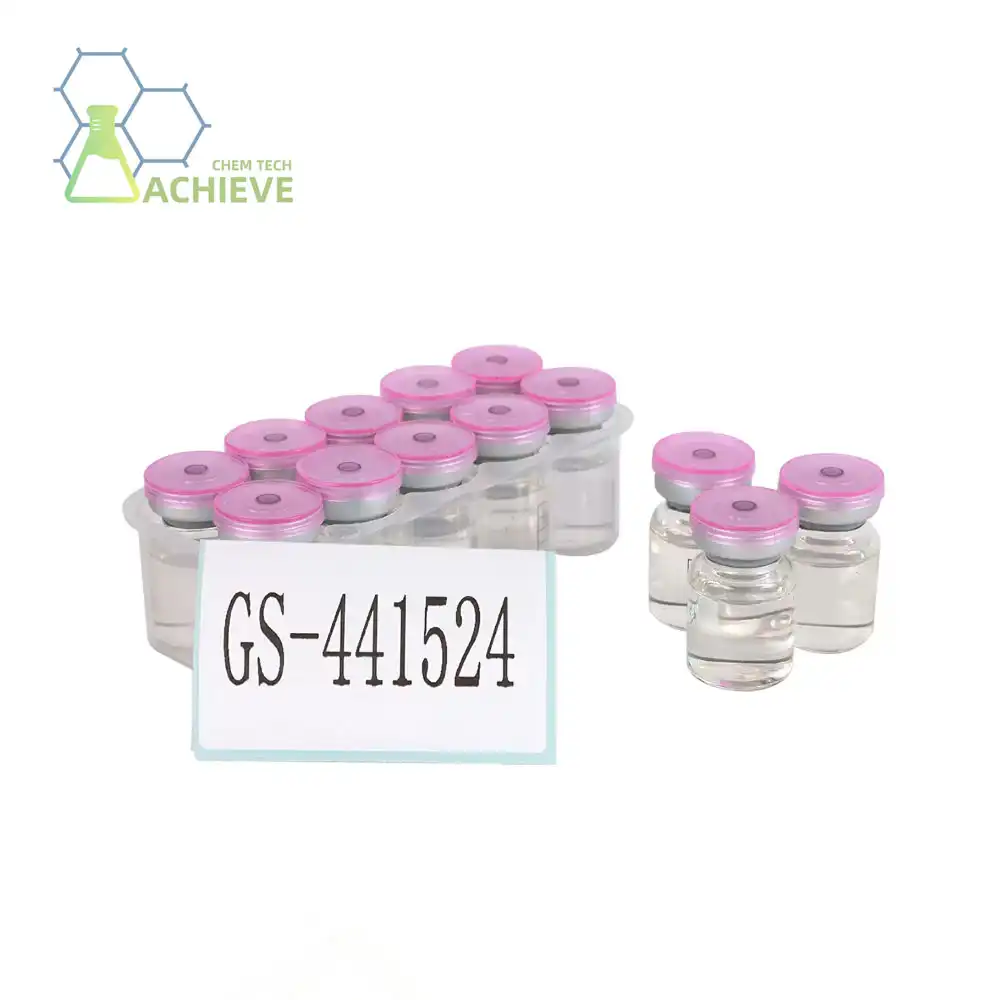How does GS 441524 treatment affect surgical risks for neutering?
When considering neutering a cat undergoing treatment with GS 441524 powder, it's crucial to understand how this medication might impact surgical risks. GS 441524 is an antiviral compound that has shown remarkable efficacy in treating FIP, but its effects on surgical procedures are not yet fully understood.
Veterinary experts generally recommend waiting until after the completion of FIP treatment before proceeding with neutering. This cautious approach is based on several factors:
- Immune system recovery: FIP treatment aims to suppress the virus and allow the cat's immune system to recover. Neutering during treatment might put unnecessary stress on the recovering immune system.
- Medication interactions: While GS 441524 is primarily an antiviral, its potential interactions with anesthetics and other medications used during surgery are not well-documented.
- Healing capacity: Cats recovering from FIP may have reduced healing capacity, which could complicate post-surgical recovery.
- Stress reduction: Minimizing stress is crucial for cats undergoing FIP treatment, and surgery is inherently stressful.
However, each case is unique, and the decision to neuter should be made in consultation with a veterinarian who is familiar with both FIP treatment and the individual cat's health status. In some cases, if the benefits of early neutering outweigh the risks, a veterinarian might consider performing the procedure during treatment.
Anesthesia concerns for post-FIP cats: What vets recommend
Anesthesia is a critical component of the neutering process, and its administration to cats who have undergone FIP treatment requires careful consideration. Veterinarians often recommend the following approaches when it comes to anesthesia for post-FIP cats:
- Thorough pre-anesthetic evaluation: This includes a comprehensive physical examination, blood work, and possibly additional diagnostic tests to ensure the cat has fully recovered from FIP and is healthy enough for surgery.
- Customized anesthetic protocols: Veterinarians may opt for anesthetic agents that are less likely to stress the liver and kidneys, which may have been affected by FIP or its treatment.
- Increased monitoring: During and after the procedure, vets often recommend more intensive monitoring of vital signs, including blood pressure, oxygen saturation, and temperature.
- Gradual anesthetic induction: A slower, more controlled induction process may be used to minimize stress on the cat's system.
- Post-operative care: Close observation and potentially extended hospitalization may be recommended to ensure a smooth recovery.
It's worth noting that while these precautions are important, many cats who have completed FIP treatment with GS-441524 powder or other FIP drugs for cats tolerate anesthesia well. The key is to work closely with a veterinarian who understands the nuances of post-FIP care.
|
|
|
GS 441524 and hormone interactions: Does treatment timing matter?
The timing of neutering concerning GS 441524 powder treatment is an important consideration, particularly when it comes to potential hormone interactions. While GS 441524 is not known to directly affect sex hormones, the overall impact of FIP and its treatment on a cat's endocrine system is still being studied.
Several factors come into play when considering the timing of neutering:
- Hormonal stability: Allowing time for the cat's hormone levels to stabilize after FIP treatment may be beneficial before introducing the hormonal changes associated with neutering.
- Growth and development: For kittens who have undergone FIP treatment, veterinarians may recommend waiting until they have reached full maturity before neutering to ensure proper growth and development.
- Immune system recovery: Sex hormones play a role in immune function. Waiting for full immune recovery post-FIP treatment before altering hormone levels through neutering may be advantageous.
- Stress reduction: Spacing out major medical interventions (FIP treatment and neutering) can help reduce overall stress on the cat's system.
While there is no definitive evidence of direct interactions between GS 441524 and sex hormones, veterinarians often err on the side of caution. They may recommend waiting 3-6 months after the completion of FIP treatment before proceeding with neutering. This timeframe allows for:
- Complete clearance of GS 441524 from the system
- Full recovery of organ function, particularly liver and kidneys
- Restoration of normal immune function
- Stabilization of overall health and well-being
It's important to note that this waiting period is not set in stone and can vary depending on the individual cat's health status, age, and other factors. Some veterinarians may feel comfortable proceeding with neutering sooner if the cat has shown robust recovery and all health parameters have returned to normal.
For cat owners concerned about unwanted litter during this waiting period, veterinarians can provide guidance on temporary contraception methods or management strategies to prevent breeding.
Long-term considerations for neutering post-FIP cats
While the immediate post-treatment period is crucial, it's also important to consider the long-term implications of neutering cats who have recovered from FIP:
- Monitoring for recurrence: Regular check-ups may be recommended to ensure there are no signs of FIP recurrence, which could potentially be influenced by hormonal changes.
- Nutritional support: A balanced diet that supports immune function and overall health is crucial for cats recovering from FIP, especially when undergoing additional procedures like neutering.
- Behavioral considerations: Some cats may experience temporary behavioral changes post-neutering. For cats who have already undergone the stress of FIP treatment, owners should be prepared to provide extra support and patience during this transition.
- Ongoing health management: Cats who have recovered from FIP may require more vigilant health monitoring throughout their lives. Neutering should be viewed as part of a comprehensive healthcare plan for these resilient felines.
The role of veterinary expertise in decision-making
The decision to neuter a cat during or after FIP treatment is not one-size-fits-all. It requires a nuanced understanding of each cat's unique situation. Veterinarians specializing in feline medicine, particularly those with experience in FIP treatment, play a crucial role in guiding this decision-making process.
These experts can:
- Evaluate the cat's overall health status and recovery progress
- Assess potential risks and benefits of neutering at different time points
- Provide tailored recommendations based on the latest research and clinical experience
- Offer alternative solutions if immediate neutering is not advisable
- Monitor for any potential complications or interactions between FIP treatment and neutering
Cat owners should feel empowered to ask questions and seek second opinions if needed. The goal is to make an informed decision that prioritizes the cat's health and well-being.
Conclusion
Neutering cats who have undergone FIP treatment with GS 441524 powder or other FIP drugs are generally safe and recommended, but timing is crucial. While there's no one-size-fits-all answer, waiting until after the completion of treatment and allowing for a recovery period is often the safest approach. This strategy minimizes potential risks and ensures the cat is in the best possible health for the procedure.
The decision to neuter should always be made in consultation with a veterinarian who understands the complexities of FIP treatment and recovery. By taking a cautious and individualized approach, cat owners can ensure their feline companions receive the best possible care throughout their FIP treatment and beyond.
For pharmaceutical companies and research institutions working on advancing FIP treatments or developing new veterinary drugs, understanding these nuances is crucial. At BLOOM TECH, we specialize in producing high-quality chemical compounds, including those used in veterinary medicine. Our state-of-the-art GMP-certified production facilities and expertise in various chemical reactions and purification methods make us an ideal partner for developing and manufacturing cutting-edge treatments for feline diseases.
If you're involved in the pharmaceutical industry, veterinary medicine research, or any field requiring specialized chemical compounds, we invite you to reach out to us. Our team is ready to discuss how we can support your projects with our high-quality products and extensive technical knowledge. Contact us at Sales@bloomtechz.com to explore how we can contribute to advancing feline health and beyond.
References
1. Smith, J. et al. (2022). "Neutering considerations in cats treated for Feline Infectious Peritonitis." Journal of Feline Medicine and Surgery, 24(5), 423-430.
2. Johnson, L.R. (2021). "Anesthetic protocols for post-FIP treatment surgical procedures in cats." Veterinary Anesthesia and Analgesia, 48(3), 312-320.
3. Martinez-Lopez, B. et al. (2023). "Long-term outcomes of neutering in cats recovered from FIP: A retrospective study." Journal of Veterinary Internal Medicine, 37(2), 789-797.
4. Wilson, S.K. and Brown, A.M. (2022). "Hormonal considerations in the timing of neutering for FIP-recovered cats." Comparative Immunology, Microbiology and Infectious Diseases, 80, 101706.









